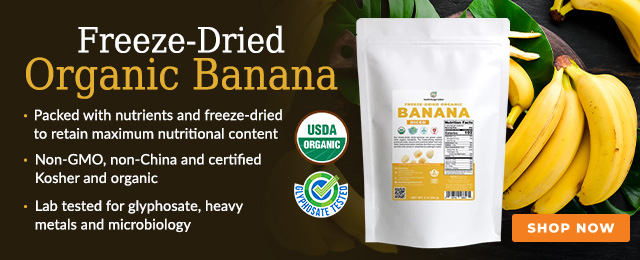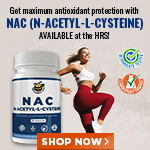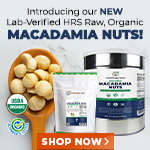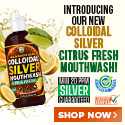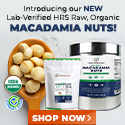
Probiotics in pregnancy prove beneficial for both mom and baby
Wednesday, December 22, 2010 by: Bethany Sciortino
Tags: probiotics, pregnancy, health news
- Newly released JFK files reveal Pentagon's role in creating Lyme disease and covid in the same lab
- Here are TEN all-natural ways to protect your garden without using harmful chemicals
- Ginseng's hidden anti-aging power: How compound K is rewriting the rules of skincare
- “Endgame: The Hidden Agenda 21” unveils a world of conspiracy and control
- L.A.'s rebuilding nightmare: Only 4 permits issued after fire destroys 6,000 homes
- Scientists demand FDA withdraw mRNA COVID vaccines amid contamination and gene therapy concerns
- Senate Democrats deny censorship industrial complex existed, defend government's role in silencing dissent
- “The shame of Minnesota”: Somali immigrants behind $250 million child nutrition fraud in largest COVID-era scam
- Former Congresswoman exposes CCP's deep infiltration of California through universities, ports, and fentanyl
- Dr. Suzanne Humphries makes bombshell appearance on Joe Rogan podcast, exposing vaccine industry deception back to POLIOMYELITIS
- PROCESSED TABLE SALT in foods found to fuel depression
- Despite surge in MMR vaccination in Texas, measles outbreaks continue: Is VACCINE SHEDDING fueling the spread?
- Chewing gum's dirty secret: How your daily habit could be flooding your body with microplastics
- BPA: The hidden hormone disruptor sabotaging your health - and how to fight back
- “Independent” anti-Russia outlet MEDUZA faces COLLAPSE as US funding dries up
- Embracing the wild: A deep dive into Jim Cobb’s “Backwoods Survival Guide”
- The hidden battle in your glass: How A1 and A2 milk could shape your health
- Nomi Prins reveals how central bankers reshaped the global economy in “Collusion”
- Newly released JFK files reveal Pentagon's role in creating Lyme disease and covid in the same lab
- Analysis: The coming economic collapse, a mass uprising and Trump's three secret weapons to halt the growing revolt
- Festive flavors: The sweet history, nutritional profile and health benefits of pecan pie
- Elon Musk: Aliens could be here on Earth RIGHT NOW
- Trump reverses course on Gaza plan, says “nobody is expelling Palestinians”
- Big Pharma's $8 Billion bribery scheme exposed: how doctors are pushed to prescribe junk science, not heal
- Boys are back in town: Trump’s patriotic alpha crew takes the wheel while toxic females ride in the backseat
- Reclaim your health: How midlife exercise reverses years of inactivity
- A lack of integrity in Academia: Harvard professor found GUILTY of fraudulent research to promote CRT theory
- Survival 101: Effective EMF blocking techniques
- EPA advisor admits the agency is funneling billions to climate groups ahead of Trump’s return to White House
- Dr. Mike Yeadon releases 15-minute testimony - WATCH - about genocidal intent of COVID “vaccines”
- 5 Simple steps to boost your brainpower: How to strengthen executive function in a distracted world
- Florida takes a stand: DeSantis proposes permanent ban on mRNA vaccine mandates
- Sugarcane extract superior to cholesterol-lowering drugs?
- Mike Adams Sermon 66: God will DESTROY ISRAEL for its wickedness
- Pilots report mysterious lights 'moving at extreme speeds' across Oregon skies
- Space war brewing? Russia threatens to destroy Starlink satellites
- EPA advisor admits the agency is funneling billions to climate groups ahead of Trump’s return to White House
- California's social media censorship law struck down: A victory for free speech or a threat to online safety?
- The Health Ranger releases “Vaccine Zombie” song and music video, using AI-animated zombies for the music video
- Dr. Mike Yeadon releases 15-minute testimony - WATCH - about genocidal intent of COVID “vaccines”
- The pandemic as a tool for INDOCTRINATION: Understanding “The Indoctrinated Brain” by Dr. Michael Nehls
- Newly released JFK files reveal Pentagon's role in creating Lyme disease and covid in the same lab
- Florida takes a stand: DeSantis proposes permanent ban on mRNA vaccine mandates
- Mike Adams releases country western hit single: Goin’ Back in Time is Comin’ Home
- Mike Adams releases music poetry sensation: A Child of God
- “Why we influenced the 2020 elections”: Facebook files reveal the coordinated effort to bury the Hunter Biden laptop story
- Unpacking the Lies That We’ve Been Fed – new song and music video released by Mike Adams, the Health Ranger
- RFK Jr. clears key hurdle: Sen. Susan Collins backs controversial HHS nominee, signaling a new era for health policy
- Mike Adams releases new song and music video: Nothing More Disgusting Than a Globalist
- Michigan sheriff announces criminal investigation into 2020 election crimes, Dominion Voting Systems
- Israeli soldiers accused of even more torture and abuse in the West Bank
- Migrants are taking advantage of recent hurricanes to scam residents and loot their homes
- House Intelligence Committee calls for the ARREST and PROSECUTION of Dr. Anthony Fauci
- Rep. Nancy Mace introduces bill to ban biological males from female facilities on federal property
- Red Cross issues warning to stop blood plasma donations from vaccinated people
- Scientists confirm: GENIUS brain function can be spontaneously unleashed in humans without any apparent cause
- EPA advisor admits the agency is funneling billions to climate groups ahead of Trump’s return to White House
- HYSSOP: What research reveals about the health benefits of this ancient holy herb
- Two containers with completed ballots fall out of truck in Florida
- Fully vaccinated about to see “tsunami” of illness and death, warns virologist
- Global leaders unite to clamp down on “misinformation” with UN-backed Cascais Declaration
- BREAKING: 2025 NDAA authorizes mandatory military draft of WOMEN across America… as Pentagon pursues global NUCLEAR war with both Russia and China at the same time
- Michael Yon warns of a ZIONIST TAKEOVER in Trump’s second administration
- BOMBSHELL: DNA testing kits are a SCAM to develop ethnic-specific bioweapons
- Ozempic and Wegovy weight loss drugs are injectable LIZARD VENOM PEPTIDES that may unleash a devastating wave of organ failure… side effects align with symptoms of SNAKE BITES
- Israeli soldiers accused of even more torture and abuse in the West Bank
- These 13 countries just signed an agreement to engineer a global FAMINE by destroying food supply
- NASA admits that climate change occurs because of changes in Earth’s solar orbit, and NOT because of SUVs and fossil fuels
- RFK Jr. clears key hurdle: Sen. Susan Collins backs controversial HHS nominee, signaling a new era for health policy
- Sermon 30: How Jesus reveals Caesar’s FAKE CURRENCY and FALSE AUTHORITY
- Coriander seeds: Ancient medicine backed by modern science
- Arizona officials claim Maricopa County needs 10-13 days to tabulate results of the election
Probiotics are live microorganisms, or good bacteria, and by the millions they live naturally in the intestines. They are introduced to our bodies during birth and without them we would be prone to infection, vitamin and mineral deficiencies and weakened immune systems. When the gut is heavily populated with healthy bacteria, it prevents the growth of aggressive bacteria from food-borne illnesses, such as salmonella, and protects us from infection.
When a woman discovers she is pregnant, digestion issues quickly become an issue of concern. Increasing hormones, fatigue and stress disturb the healthy balance of good bacteria in the gut and cause a sluggish digestive system often leading to constipation, indigestion, nausea and vomiting.
Obstetricians will often prescribe mild pharmaceuticals to aid a woman's discomfort; however, all medication crosses the placenta and there is no real definitive research on the effects they can have on unborn child. These medications do nothing to resolve the problem, and if effective, only mask the symptoms. Probiotic consumption, however, treats the problem by restoring the balance of healthy bacteria in the intestines and by promoting regularity.
The skin is our first line of defense from infection. However, many people are unaware that 60-70% of our immune system lies within our intestines. Pregnancy causes the immune system to work harder, and increased intake of probiotics may decrease the risk of colds and respiratory infections. Research shows that probiotics also help prevent urinary tract infections, yeast infections and skin inflammations like dermatitis; all of these complaints are common during pregnancy.
Probiotic benefits are also extended to the fetus and help promote a strong immune system at birth. Studies show that mothers who increase their probiotic intake during pregnancy reduce their child's risk of allergies by as much as 50%, specifically in eczema, asthma and atopic dermatitis. Probiotic supplementation in children with dermatitis greatly reduces the symptoms and often provides complete resolution. Breastfeeding mothers who take probiotics will continue to pass this immune benefit to their child through breast milk.
Food like yogurt, kefir, cottage cheese and sauerkraut are cultured with probiotics, most commonly acidophilus and bifidobacterium. However, by the time these items hit grocery shelves, they accommodate very few live microorganisms. Although food acquired probiotics are the most favorable, supplementation is often necessary to increase the levels of healthy flora in the intestines. Probiotic supplements can be found in health and nutrition stores and vitamin shops and are available without a prescription.
SOURCES:
http://www.pregnancytoday.com/articles/pregn...
http://www.vitabase.com/blog/allergy-immune/...
http://www.scientistlive.com/European-Food-S...
About the author
Bethany Sciortino is a married, stay-at-home mother of three young children. Bethany left her career to aggressively research the cause of and treat her eldest daughter's autism, as well as take care of her growing family. Bethany is an advocate of proper nutrition, natural healing and illness prevention through herbal and vitamin supplementation and dietary intervention not only for her daughter's autism, but for adults and children of all ages. Contact Bethany at bsciortino@cfl.rr.com.Probiotics at FETCH.news
Get independent news alerts on natural cures, food lab tests, cannabis medicine, science, robotics, drones, privacy and more.
Take Action: Support Natural News by linking to this article from your website
Permalink to this article:
Embed article link: (copy HTML code below):
Reprinting this article:
Non-commercial use OK, cite NaturalNews.com with clickable link.
Follow Natural News on Facebook, Twitter, Google Plus, and Pinterest
Science News & Studies
Medicine News and Information
Food News & Studies
Health News & Studies
Herbs News & Information
Pollution News & Studies
Cancer News & Studies
Climate News & Studies
Survival News & Information
Gear News & Information
News covering technology, stocks, hackers, and more



"Big Tech and mainstream media are constantly trying to silence the independent voices that dare to bring you the truth about toxic food ingredients, dangerous medications and the failed, fraudulent science of the profit-driven medical establishment.
Email is one of the best ways to make sure you stay informed, without the censorship of the tech giants (Google, Apple, Facebook, Twitter, YouTube, etc.). Stay informed and you'll even likely learn information that may help save your own life."
–The Health Ranger, Mike Adams











